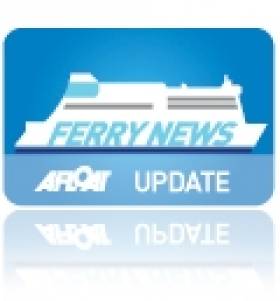Displaying items by tag: Sten A Ollsen
What’s In a Name: Sten A. Ferry- 50 Years in Service
#STENA 50 YEARS- This year marks the 50th anniversary of Stena Line, the household name of the Swedish owned ferry giant. The company took the trading name from founder Sten A. Ollsen who began originally in 1939 with a small chartered cargoship named Dan, after his son, who currently holds several chairman positions throughout the Stena sphere of operations, writes Jehan Ashmore.
The first foray into a passenger (only) ferry was in 1962 with chartered tonnage on a route from Stenpiren in Gothenburg to Skagen in Denmark. The vessel the MS Østersøen was packed with happy, Christmas-shopping Gothenburgers looking for alcohol, tobacco and food at bargain prices! It seemed as if a new phenomenon had started in Gothenburg.
Only two years later the company had announced its first custom-built car ferry, Stena Germanica, which was to serve on the night-service from Gothenburg to Kiel. As the company continued to become successful, more routes were developed and new or chartered tonnage was added.
Among the new vessels ordered during the 1970's was Stena Scandinavia, one of a quartet of well proportioned and handsome looking car-ferries built for Stena's Scandinavian service. She served the Swedish-German route for five years until sold in 1978 to Irish Continental Line (ICL) to become Saint Killian (scroll down) on Irish-French routes.
In 1981/2 she was lengthened and renamed Saint Killian II, a name she retained also with her Irish Ferries career. She was sold in 1998 to Greeks interests, then resold with the vessel chartered to Algérie Ferries. There were also periods of lay-up until she was scrapped in 2007 in Alang, India.
Over the past four decades the Stena Line group has expanded considerably and is one of the world's largest ferry operators with an extensive ferry (and freight) network of 19 routes in Scandinavia and radiating from ports in the UK. In total the routes connect eight countries, served by 35 vessels, and overall the company employ 5,700 people.
Stena Line are running a 50 years with memories! campaign, where prizes are being given away including a year's free travel with the operator, and 5 iPhones, for details click HERE.





























































